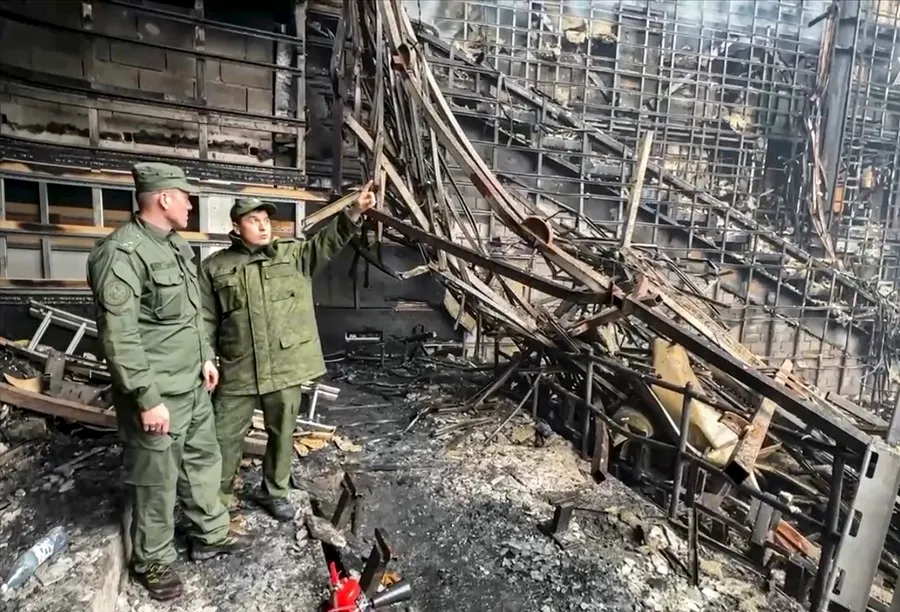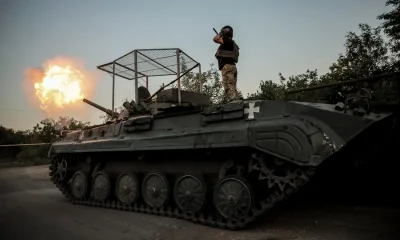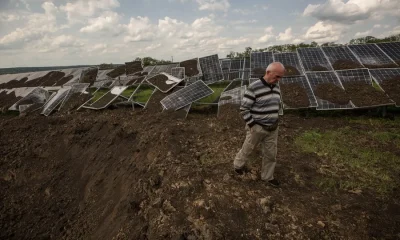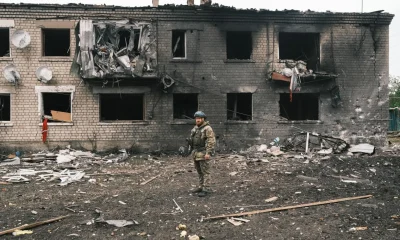International
The international community unanimously condemns the Moscow attack

The international community has unanimously condemned the brutal jihadist attack committed on Friday in Moscow, which caused at least 133 deaths and 120 injuries, and which has triggered a massive wave of solidarity with the victims.
The attack, which occurred on Friday afternoon in the Crocus City Hall concert hall, on the outskirts of Moscow, was claimed by the jihadist organization Islamic State (IS) on social media, while the Federal Security Service (FSB) of Russia reported the arrest of eleven involved in the attack.
After the attack, the Russian Foreign Ministry called on the international community to condemn him. “The entire international community is obliged to condemn this horrible crime,” said María Zajárova, the foreign spokeswoman, on her Telegram channel. Convictions have happened all over the world.
From the United Nations, the European Union or the African Union, through the governments of Germany, China, India or Japan, the rejection has been resonated forcefully against terrorist attacks.
The UN Secretary General, Antonio Guterres “condemns the terrorist attack in the strongest possible terms,” his spokesman, Farhan Haq, said in a brief note; the Security Council, in a broader note, also condemned that “atrocious and cowardly terrorist attack” and its members urged the international community to “actively cooperate with the Government of the Russian Federation” and other authorities to achieve justice.
From the EU, the High Representative for Foreign Affairs, Josep Borrell, condemned this Saturday “in the strongest terms” yesterday’s “atrocious” attack “against defenseless people,” and so did the president of the European Commission, Ursula von der Leyen, who “forcefully” condemned the attack, and the president of the European Council, Charles Michel, who lamented the “horrible terrorist attack.”
The president of the African Union Commission (AU), Moussa Faki Mahamat, condemned the attack and offered his solidarity with Russia. “I was shocked to learn about the horrible terrorist attack in Moscow, which claimed many victims,” he said on his social network account X.
From Latin America, the Bolivarian Alliance for the Peoples of Our America (ALBA) expressed its categorical condemnation and repudiated “any act of violence that violates the life and security of citizens,” while reiterating its commitment “to peace, tolerance and respect for human life.”
The United States, through the mouth of Secretary of State, Antony Blinken, also condemned the “terrorist attack” in Moscow this Saturday. “We stand in solidarity with the people of Russia who regret the loss of life after this horrible event,” the diplomat wrote on his social network X account.
In Europe, the German chancellor, Olaf Scholz, condemned “the horrible attack on innocent people who visited a concert. We think about the debts and the wounded,” she said on her X account, while the Foreign Minister, Annalena Baerbock, expressed herself in similar terms on the same social network.
Italy also rejected “the horror of the killing of innocent civilians in Moscow,” which it considers “unacceptable.”
To these convictions must be added those of other EU countries such as Spain, the Netherlands, Belgium, Luxembourg or Hungary.
Chinese President Xi Jinping sent a message of condolences to his Russian counterpart, Vladimir Putin, on Saturday. Xi stated in his letter that he is “shocked” by what happened and expressed his “deep condolences” to the victims and their families, as well as his “sincere solidarity” with the wounded.
Other countries in the region such as India, South Korea or Japan also expressed their condolences.
Iran strongly condemned the attack. “I strongly condemn the recent terrorist attack in Moscow and express my deepest condolences to the families of the victims and my colleague Sergei Lavrov, the Government and the people of Russia in relation to this tragic terrorist attack,” said Iranian Foreign Minister Hosein Amir Abdolahian, in X. “The joint and effective fight against terrorism requires serious and non-discriminatory measures on the part of the international community,” he added.
There were also convictions from countries such as Egypt, Tunisia and Morocco.
The president of Syria, Bachar al-Asad, assured this Saturday that the Moscow attack is “directly related to the defeats of neo-Nazism” in the Donbas, in an apparent veiled reference to Ukraine.
Al Asad conveyed this message to Putin in a telegram in which he stated that “this cowardly attack against innocent people demonstrates the inability to force the Russian people to deviate from their principles,” according to a statement from the Presidency in Damascus.
From Ibero-America, the Government of Brazil “repudiated” and declared itself “dismayed” by the terrorist attack, just like Mexico, from where the (SRE) Ministry of Foreign Affairs, in a message in X “rejects any act of violence that threatens the lives of civilians.”
Argentina also expressed its “strong condemnation” and “repudiation” of the attack, as well as Colombia, Venezuela, Ecuador, Peru, Cuba, Honduras and Nicaragua.
International
U.S. Senate Rejects Budget, Bringing Government Closer to Shutdown Amid DHS Dispute

The U.S. Senate voted on Thursday against a budget proposal in a move aimed at pressuring changes at the Department of Homeland Security (DHS), following the killing of two civilians during a deployment of immigration agents in Minneapolis.
All Senate Democrats and seven Republican lawmakers voted against the bill, which requires 60 votes to advance, pushing the country closer to a partial government shutdown that would cut funding for several agencies, including the Pentagon and the Department of Health.
The rejection came as Senate leaders and the White House continue negotiations on a separate funding package for DHS that would allow reforms to the agency. Proposed measures include banning Immigration and Customs Enforcement (ICE) agents from wearing face coverings and requiring them to use body-worn cameras during operations.
The vote took place just hours after President Donald Trump said he was “close” to reaching an agreement with Democrats and did not believe the federal government would face another shutdown, following last year’s record stoppage.
“I don’t think the Democrats want a shutdown either, so we’ll work in a bipartisan way to avoid it. Hopefully, there will be no government shutdown. We’re working on that right now,” Trump said during a Cabinet meeting at the White House.
International
Trump Says Putin Agreed to One-Week Halt in Attacks on Ukraine Amid Extreme Cold

U.S. President Donald Trump said on Thursday that he secured a commitment from Russian President Vladimir Putinto halt attacks against Ukraine for one week, citing extreme weather conditions affecting the region.
“Because of the extreme cold (…) I personally asked Putin not to attack Kyiv or other cities and towns for a week. And he agreed. He was very pleasant,” Trump said during a Cabinet meeting broadcast by the White House.
Trump acknowledged that several advisers had questioned the decision to make the call.
“A lot of people told me not to waste the call because they wouldn’t agree. And he accepted. And we’re very happy they did, because they don’t need missiles hitting their towns and cities,” the president said.
According to Trump, Ukrainian authorities reacted with surprise to the announcement but welcomed the possibility of a temporary ceasefire.
“It’s extraordinarily cold, record cold (…) They say they’ve never experienced cold like this,” he added.
Ukrainian President Volodymyr Zelensky later commented on the announcement, expressing hope that the agreement would be honored.
International
Storm Kristin Kills Five in Portugal, Leaves Nearly 500,000 Without Power

Storm Kristin, which battered Portugal with heavy rain and strong winds early Wednesday, has left at least five people dead, while nearly half a million residents remained without electricity as of Thursday, according to updated figures from authorities.
The revised death toll was confirmed to AFP by a spokesperson for the National Emergency and Civil Protection Authority (ANPEC). On Wednesday, the agency had reported four fatalities.
Meanwhile, E-Redes, the country’s electricity distribution network operator, said that around 450,000 customers were still without power, particularly in central Portugal.
Emergency services responded to approximately 1,500 incidents between midnight and 8:00 a.m. local time on Wednesday, as the storm caused widespread disruptions.
The Portuguese government described Kristin as an “extreme weather event” that inflicted significant damage across several regions of the country. At the height of the storm, as many as 850,000 households and institutions lost electricity during the early hours of Wednesday.
Several municipalities ordered the closure of schools, many of which remained shut on Thursday due to ongoing adverse conditions.
Ricardo Costa, regional deputy commander of the Leiria Fire Brigade, said residents continue to seek assistance as rainfall persists.
“Even though the rain is not extremely intense, it is causing extensive damage to homes,” he noted.
In Figueira da Foz, a coastal city in central Portugal, strong winds toppled a giant Ferris wheel, underscoring the severity of the storm.
-

 Central America5 days ago
Central America5 days agoGuatemala seizes over a ton of cocaine hidden in flour at Pacific port
-

 Central America4 days ago
Central America4 days agoGuatemala Police Arrest Prison Guard Caught in the Act of Extortion
-

 Central America4 days ago
Central America4 days agoHonduras swears in conservative president Asfura after disputed election
-

 International5 days ago
International5 days agoHistoric snowstorm paralyzes Toronto after 60 centimeters of snow
-

 Central America4 days ago
Central America4 days agoBukele leads public trust rankings as UCA survey highlights gains in security
-

 International3 days ago
International3 days agoFootball Fan Killed in Clashes After Colombian League Match
-

 International5 days ago
International5 days agoSpain’s irregular migrant population rises to 840,000, study finds
-

 Central America3 days ago
Central America3 days agoGuatemala President Says Starlink Terminal Found Inside Prison
-

 International4 days ago
International4 days agoDoomsday clock moves to 85 seconds before midnight amid rising global risks
-

 International4 days ago
International4 days agoWinter Storm Fern Leaves 30 Dead and Over One Million Without Power Across the U.S.
-

 International2 days ago
International2 days agoU.S. Senate Rejects Budget, Bringing Government Closer to Shutdown Amid DHS Dispute
-

 Sin categoría4 days ago
Sin categoría4 days agoEight Killed in Series of Armed Attacks in Ecuador’s Manabí Province
-

 International4 days ago
International4 days agoSpain approves plan to regularize up to 500,000 migrants in Historic Shift
-

 International5 days ago
International5 days agoRights group says nearly 6,000 killed in Iran protest crackdown
-

 International3 days ago
International3 days agoRubio Says U.S. Could Participate in Follow-Up Russia-Ukraine Talks
-

 International3 days ago
International3 days agoMissing Spanish Sailor Rescued After 11 Days Adrift in Mediterranean
-

 Sin categoría4 days ago
Sin categoría4 days agoEl Salvador Launches Fourth Year of Ocean Mission to Protect Marine Ecosystems
-

 Central America13 hours ago
Central America13 hours agoPanama Supreme Court Strikes Down Panama Ports Concession as Unconstitutional
-

 International5 days ago
International5 days agoVenezuela frees at least 80 political prisoners, NGO says
-

 International5 days ago
International5 days agoEU launches new probe into X over AI-generated fake nude images
-

 International2 days ago
International2 days agoStorm Kristin Kills Five in Portugal, Leaves Nearly 500,000 Without Power
-

 Central America13 hours ago
Central America13 hours agoU.S. and Guatemala Sign Trade Deal Granting Zero Tariffs to Most Exports
-

 International2 days ago
International2 days agoTrump Says Putin Agreed to One-Week Halt in Attacks on Ukraine Amid Extreme Cold
-

 International2 days ago
International2 days agoMan Arrested After Vehicle Crashes Into Jewish Institution in Brooklyn
-

 International5 days ago
International5 days agoSevere winter storm grips U.S., leaves multiple dead as extreme cold persists
-

 International5 days ago
International5 days agoFrance debates ban on social media for children under 15




































